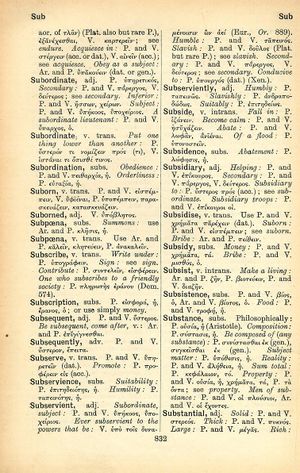subservient: Difference between revisions
From LSJ
Μὴ λοιδόρει γυναῖκα μηδὲ νουθέτει → Noli increpare neu monere mulierem → Schimpf' eine Frau nicht aus noch weise sie zurecht
(Woodhouse 5) |
(CSV5) |
||
| Line 1: | Line 1: | ||
{{ | {{Woodhouse1 | ||
| | |Text=[[File:woodhouse_832.jpg|thumb|link={{filepath:woodhouse_832.jpg}}]]'''adj.''' | ||
<b class="b2">Subordinate, subject</b>: P. and V. [[ὑπήκοος]], [[ὑποχείριος]]. | |||
<b class="b2">Ever subservient to the powers that be</b>: V. ὑπὸ τοῖς δυναμένοισιν ὢν ἀεί (Eur., ''Or.'' 889). | |||
<b class="b2">Humble</b>: P. and V. [[ταπεινός]]. | |||
<b class="b2">Slavish</b>: P. and V. [[δοῦλος]] (Plat. but rare P.); see [[slavish]]. | |||
<b class="b2">Secondary</b>: P. and V. [[πάρεργος]], V. [[δεύτερος]]; see [[secondary]]. | |||
<b class="b2">Conducive to</b>: P. [[ὑπουργός]] (dat.) (Xen.). | |||
}} | }} | ||
Revision as of 10:05, 21 July 2017
English > Greek (Woodhouse)
adj.
Subordinate, subject: P. and V. ὑπήκοος, ὑποχείριος.
Ever subservient to the powers that be: V. ὑπὸ τοῖς δυναμένοισιν ὢν ἀεί (Eur., Or. 889).
Humble: P. and V. ταπεινός.
Slavish: P. and V. δοῦλος (Plat. but rare P.); see slavish.
Secondary: P. and V. πάρεργος, V. δεύτερος; see secondary.
Conducive to: P. ὑπουργός (dat.) (Xen.).

